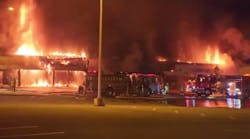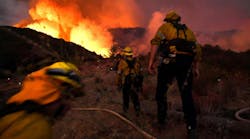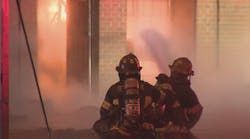Filmmakers Brenna Sanchez and Tom Putnam spent two 24-hour shifts with firefighters assigned to Engine 50 in Detroit. They want to make a documentary about the city and showcase firefighters as the storytellers.
Financial backers were concerned there wouldn't be enough dramatic footage to hold viewers' interest -- that there wouldn't be enough flames and, frankly, the documentary would be boring. So, they gave them a little money to make a movie trailer, a teaser of sorts, to see whether there really was a compelling story to be told.
Their concern was unfounded.
In the short time the film crew was in the city, there were 10 working, box-alarm fires, including an explosive chemical plant blaze that provided some spectacular footage -- all in the two, 24-hour shifts.
Indeed, there was no shortage of fires and compelling footage.
That's sort of the point that Sanchez and Putnam, two Californian documentary makers, are trying to prove. Detroit is burning at an alarming rate and the only thing trying to stop it is the city's fire department.
The Concept
"Burn: One Year on the Front Lines of the Battle to Save Detroit," is a documentary in the making and the brainchild of Sanchez, who is a native Detroiter. She has a goal of documenting firefighters' efforts to save their city, squelching the all-consuming fire block by block.
"Detroit firefighters are very smart people," Sanchez said in a recent interview with Firehouse.com. "They're not irrational people. They wouldn't be doing what they're doing, fighting fires in Detroit, if they didn't believe the city was worth fighting for. They're staying right where they are, doing their jobs every day. It just tears your heart out. They don't want to walk away. They don't believe Detroit is just some black hole from which you walk away."
Neither do Sanchez and Putnam, who hope to raise funds for their documentary through donations from individuals and supportive corporations and organizations. They need some $90,000 to start filming in October and they are hoping critical acclaim for their 10-minute trailer will spur contributions to the cause. Firehouse.com is a sponsor to the project. As of Friday, Aug. 20, the filmmakers had raised $6,102.
It's important to the project that filming begins in October, a time when Detroit experiences a spike in arson fires, on and around "Devil's Night," the day before Halloween. The filmmakers want to be there for that and follow firefighters through four seasons, with the intention of releasing the documentary by Sept. 11, 2011, the 10th anniversary of the terrorists' attack on the United States.
"For me, as a Detroiter and an American, I see Detroit at a crossroads," Sanchez said. "It's an iconic city. People know it as Motown. They know about Kid Rock. They know about Eminem. Everybody has an idea of what Detroit is... we need to focus on what it can be."
Because Detroit is emblematic of what the country used to be - and what it can be in the future - Sanchez said it has a story to tell.
With firefighters as the storytellers, the 10-minute trailer sketches out what the full-length film will be.
It was released in July and in the first three weeks, it had been viewed by more than 65,000 individuals. The video is posted here at Firehouse.com and at www.detroitfire.org.
"If everyone who looked at it had donated five or 10 dollars, we would be filming by now," Sanchez said.
Sanchez and Putnam, who is also the director of "Burn," hooked up with the International Documentary Association (IDA), a 501 (c) (3) non-profit organization which serves as the project's fiscal sponsor. Contributions to the documentary are payable to IDA, which uses PayPal to accept contributions, and are tax-deductible to the extent permitted by law.
The Beginning
The concept for the project started in December 2008, when Sanchez was home for the holidays. On Nov. 15 that year, Detroit Firefighter Walt Harris was killed fighting a fire in a vacant home. The roof collapsed, inflicting fatal injuries on Harris and trapping colleagues.
Sanchez learned of the tragedy while home in Detroit for the holidays, and the event triggered her creative juices. As a documentary filmmaker, she recognized the importance of the story, picked up the telephone and called Putnam, who had made films with her in the past.
"Literally, within an hour, Brenna was on the phone with me," Putnam said. "What she had in mind was a pretty amazing story."
Putnam said he was immediately on board with the project.
"I am a documentary filmmaker," Putnam said. "I like doing films about people with amazing stories, and this is an amazing story."
Armed with a solid story and backed by a solid track record of filmmaking, Sanchez and Putnam went to the Public Broadcasting Service (PBS) with the idea.
"We went to their R&D department and they gave us a little funding to do a trailer," Putnam said. He added that PBS was concerned there wouldn't be enough action and story line for a full-length documentary and the seed money would determine whether they wanted to pursue the project.
Over a five-day period last year, the film crew shot nearly 100 hours of film.
"There were so many fires, it was almost non-stop," Putnam said. "And the firefighters were telling us it was a slow period. There is definitely no shortage of fires in Detroit."
From their experience, Sanchez and Putnam decided the story was much bigger than what they originally envisioned. They decided the story needed to be cast in a very positive light to let the world know that Detroit shouldn't be written off.
"The firefighters put it all on the line because they believe in the city," Putnam said. "No one else is taking the saving of Detroit as seriously as the firefighters."
In the opening lines of the trailer, the filmmakers spell out Detroit's plight in black and white -- high crime, high poverty, a shrinking population and urban blight that has wiped out neighborhoods. Putnam said he hopes the film will be the first "boots on the ground" documentary of the life that's under all the decay.
A Potential Problem
Sanchez said it's her goal to be as faithful to the story as possible and to not sensationalize the film in any way. Detroit hasn't had the best press lately, she acknowledged, and found herself earlier this month having to smooth ruffled feathers.
It seems the city's mayor had put what amounts to a moratorium on filming in the city because of some recent bad press.
In July, Detroit Police Chief Warren Evans resigned in the wake of what could be characterized as a botched execution of a search warrant for a murder suspect. As a reality film crew followed police officers to the scene, with cameras rolling, an officer opened fire and killed a 7-year-old girl who was sleeping inside the home. The show, called "The Chief," portrayed the police chief as a cowboy-like character that city administrators did not appreciate, according to media reports.
Soon after the city announced it was examining its filming policies, Sanchez found herself flying halfway across the country to have a face-to-face meeting with the fire commissioner. She told the commissioner her plans and described her vision of the film. She left feeling positive the filming would be allowed to proceed as planned this fall.
While Firehouse.com was seeking comment on this project from city officials, Detroit suffered a devastating fire and commercial building collapse that injured six firefighters, four of them critically.
Attempts to seek comment from fire department officials have not been successful and attempts to reach someone in the city's administration and film bureau have also not yet been successful.
While acknowledging that Detroit's hiccup on filming presented a momentary challenge, Sanchez said it also provided a huge opportunity. She got to meet with the city's new fire commissioner, who didn't know anything about her film, and to have his full attention.
"He could have stonewalled me, but he didn't," she said. "He listened and was interested."
Putnam said he understands why the city is skeptical about filmmakers who might want to exploit Detroit and its situation. He said, however, that's not what he and Sanchez want to do.
Moving Forward
"There is an amazing personal story with the firefighters that we want to tell," Putnam said. "They don't get the press they should. People want to go in there and show the burned out dying city. There's much more to this city than bunches of burned out buildings. The firefighters are the ones who are out there, putting it all on the line and trying to save the city one building at a time."
Editor's Note: Those who would like to contribute to the making of the film may do so by visiting here and clicking on the "Make a Donation" button.





